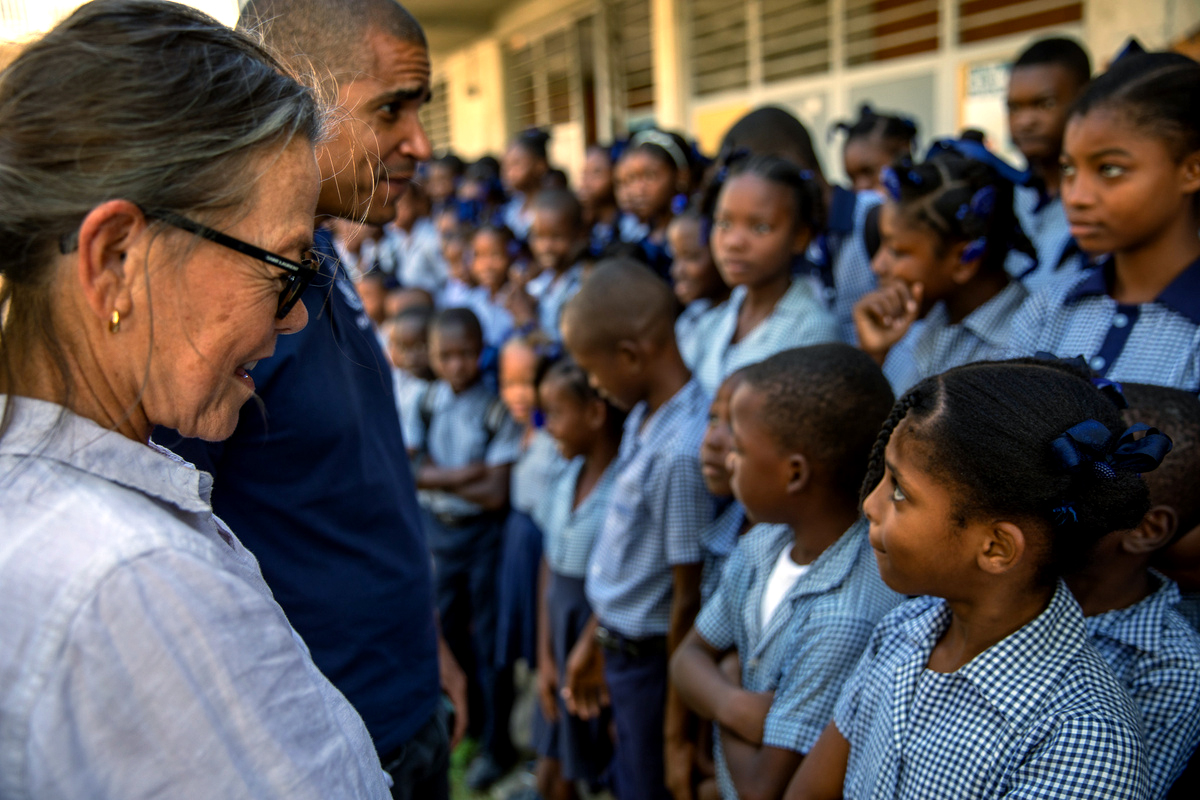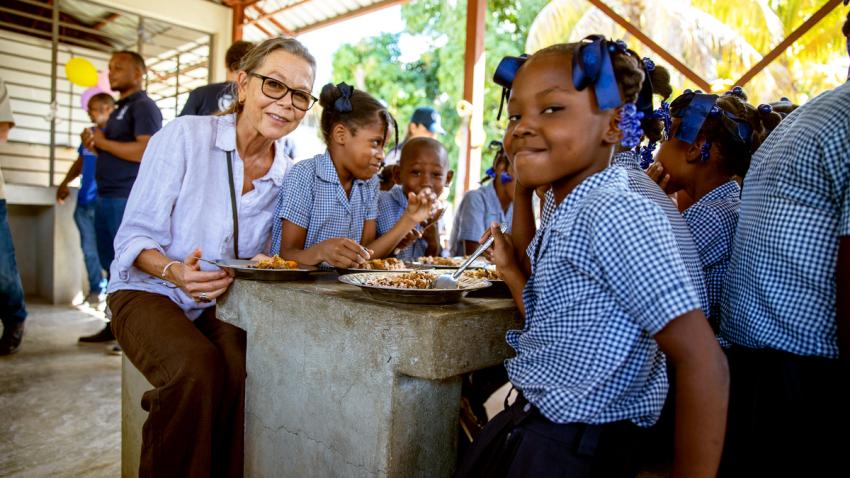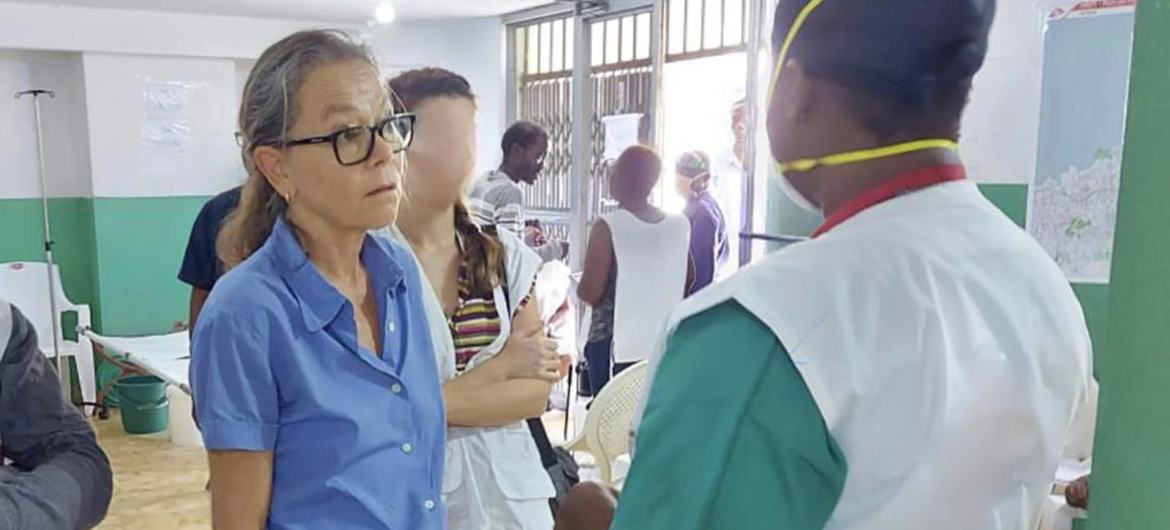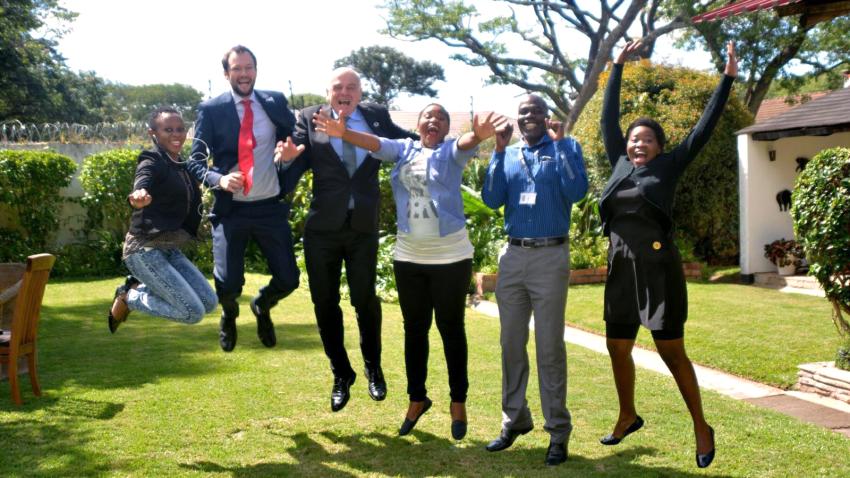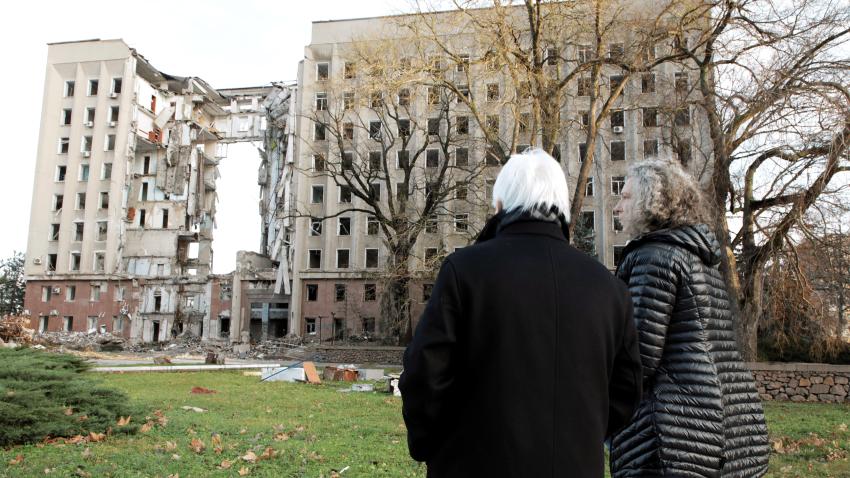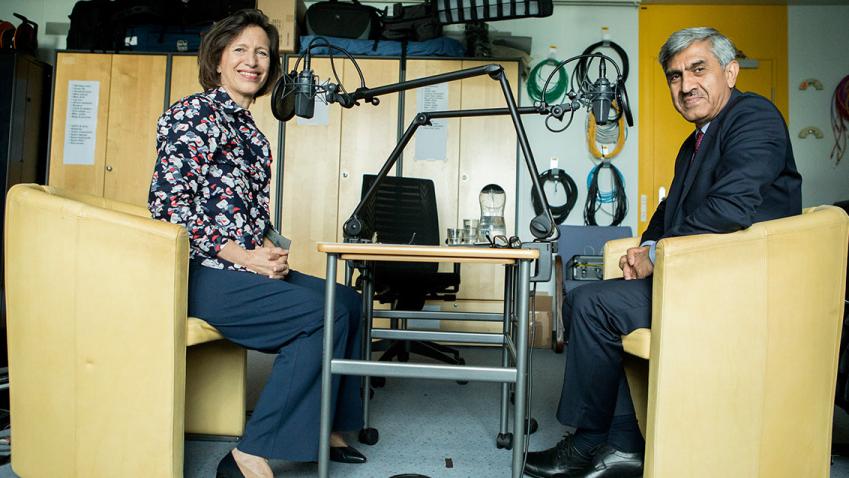Ulrika Richardson has dedicated her life to the UN. As resident and humanitarian coordinator in Haiti, her belief in the organization’s idealistic values drives her to brave significant dangers in her mission to alleviate the suffering she has witnessed there.
“When you see people suffer, those images stay with you … that keeps you awake, and it *should* keep you awake.”
Life in Haiti remains precarious. Armed gangs, cholera, and fuel and food shortages mean violence, hunger, disease, and deprivation are everyday hurdles for millions of Haitians. In this episode, Ulrika Richardson reflects on the scale of their suffering, on preserving the dignity of those in need, and on the importance of saying goodbye.
The United Nations Secretary-General António Guterres announced the appointment of Ingeborg Ulrika Ulfsdotter Richardson of Sweden as his new Deputy Special Representative for the United Nations Integrated Office in Haiti (BINUH) and Resident Coordinator in Haiti (May 12, 2022). Ms. Richardson also serves as Humanitarian Coordinator.
Multimedia and Transcript
Ulrika Richardson 00:00
When you see people suffer, those images stay with you. When I speak to colleagues and people that you can sort of confide in, and you know, and you can cry a little bit, because you need to evacuate some of those feelings, right? But I think when you go to sleep, you have those images. And I think that keeps you awake, and it should keep you awake.
Melissa Fleming 00:21
From the United Nations, I'm Melissa Fleming. Welcome to Awake at Night. My colleague Ulrika Richardson has dedicated much of her life to working for the UN because it is as she told me an idealistic organization. And that's what keeps her going, especially in her current posting in Haiti, where she is the Resident and Humanitarian Coordinator. Welcome, Ulrika.
Ulrika Richardson 01:03
Thank you, Melissa.
Melissa Fleming 01:04
So, you've worked in many crisis-hit areas. But before we hear and go backwards in time, I'd like to ask you about how the situation is in Haiti right now. We're hearing so many reports of how precarious it is.
2022-12-08: Humanitarian Situation in Haiti - Press Conference
Briefing journalists in New York, Ms. Ulrika Richardson, Resident and Humanitarian Coordinator in Haiti, informed on the latest worrying numbers of the cholera outbreak. Cases continue to rise and 283 people have now died from the illness. Close to 12,000 people have been hospitalized since 2 October and there are more 14,000 suspected cases across the country.
“And what we are seeing in fact is not only the continued increase of cholera cases, but also the spread to the regions and there is now in eight of the 10 departments there are confirmed cholera cases,” - Ulrika Richardson.
More information available on the UN YouTube Channel
Read related news story by UN News
Ulrika Richardson 01:20
Yeah. I think for many Haitians life is really almost inhuman. And we're talking about the poorer Haitians. Let's say those that live in really vulnerable areas and people who sort of have to face violence on a daily basis. The gangs now hold basically 60% of the capital in its grip. So what people are facing is really the risk of being caught in line of fire. Meaning where the gangs… They fight between each other to gain new territory or to defend that territory. And with that also that means that populations are also actually opposed, you know, against each other. And so, people can't move from one place to another. And women in particular, they risk being raped. Rape is used as a very common form of instilling fear to punish, to deter. And so, I would say for many Haitians, life is really, really very difficult.
Melissa Fleming 02:23
So, take us back. I mean, Haiti has always been troubled, but it was after the assassination of the president...
Ulrika Richardson 02:30
So, after the assassination of President Moïse Jovenel - this was in July last year - the gang violence increased. And since then, it's been a steady, let's say intensification of the gang violence. And you have gangs who create coalitions and then the coalitions fight with each other. And these gangs, they're also heavily armed. Some of them have quite a good command and control structure. And so, it's almost as if you would deal with sort of militia in a way. Some of them.
Melissa Fleming 03:10
Where are the police? And is it not working at all?
Ulrika Richardson 03:14
The police, it's an institution that is a bit of a, I would guess, a contradiction. Because it is one of the institutions that actually works in Haiti, but it's a very small police force. So, you have 13,000, more or less. And this means that the police per capita, the ratio is very low. So, it's like half of what is normally the case in other countries. And then if you think of the police, as you know, they're not always paid. And they are poorly trained. The equipment is not up to date, and it's very, you know, leaves a lot to be improved. And then the fact that you don't have a military. So, the police, I mean, it does a lot of things. It's not only policing the streets. They are also firemen. They are the prison guards. So, that means that there is a lot of demand on that very small police force.
Melissa Fleming 04:13
They can't stand up to the gangs.
Ulrika Richardson 04:15
Very little. I mean, we've seen there's been instances where they've done successful operations. But to stand up to these gangs is close to impossible. So, the country… That political instability is, of course, also impacting the situation overall. The prime minister currently is the prime minister that was prime minister at the time of the assassination. And that's why he then launched this appeal to the letter of requesting international aid. And he sent that letter to the Secretary-General who then responded positively and said, ‘Yes. He's asking the, you know, UN Member States to assist Haiti.’
Melissa Fleming 04:52
With troops.
14 Oct.
2022
HAITI: GANGS USE SEXUAL VIOLENCE TO INSTILL FEAR – UN REPORT
GENEVA and PORT-AU-PRINCE: A joint human rights report published by the United Nations Integrated Office in Haiti (BINUH)and the Office of the United Nations High Commissioner for Human Rights (OHCHR), entitled “Sexual violence in Port-au-Prince: a weapon used by gangs to instill fear” finds that children as young as 10 and elderly women have been subjected to collective rapes for hours in front of their parents or children by more than half a dozen armed elements amid an explosion of gang violence in Haiti’s capital, Port-au-Prince.
Ulrika Richardson 04:53
With an international rapid armed force to come in and help basically free the country from the violence. And that was also the time when this fuel terminal, the country's main fuel terminal, was under, was occupied by the gangs. This was during… It was from mid-September to mid-November. So, that was two months where basically there was no fuel in the country. And this was exactly during that time that the cholera broke out again.
Melissa Fleming 05:25
And cholera does not exist in places that have clean water.
Ulrika Richardson 05:29
No.
Melissa Fleming 05:30
So, what's…? So, the whole water infrastructure is also not working.
Ulrika Richardson 05:34
Yeah. So then there had been a situation where in these, again, the poor neighbourhoods, a very emblematic neighbourhood called Cité Soleil, which, you know, you hadn't seen access to clean water. No waste collection. There are no latrines. And it was the rainy season. So, you know, it rains from basically from July-August. And we had the cholera outbreak in October. And of course, when you don't have, you know, any type of water sanitation, waste collection combining with rain. And really also the fact that people were going hungry. We had 20% of acute malnutrition among children in Cité Soleil. 20%. That means one child out of five were acutely malnourished. And that means that they then of course become much more vulnerable to any type of disease.
Melissa Fleming 06:32
And it was not that there isn't food in the country. It was that they didn't have access to it.
Ulrika Richardson 06:38
Yeah. They didn't have access to food. Food is a big problem in Haiti. Haiti was self-sufficient in rice production before the 1980s. Then there was sort of free market structural adjustment. And then, they sort of liberated the import. And since then, Haiti now depends almost 100% on food imports, including rice. And it is a country where… It's the most beautiful country I've seen. I think anything could grow in Haiti. You have - we were just talking - the fruits, the vegetables. What you find… And you don't find all that much because the gangs have also blocked the access to the food producing south and to the north industrial zones. So, that combined with the insecurity. For Haitians, that's what I'm saying. For me it's really painful too and it's heartbreaking when you see what people have to go through. And the level. We have reports of people dying of hunger. In the prisons, yes. But also, in communities. There's just not enough food.
Melissa Fleming 07:51
So, this must make working for the UN in an environment like that extremely difficult.
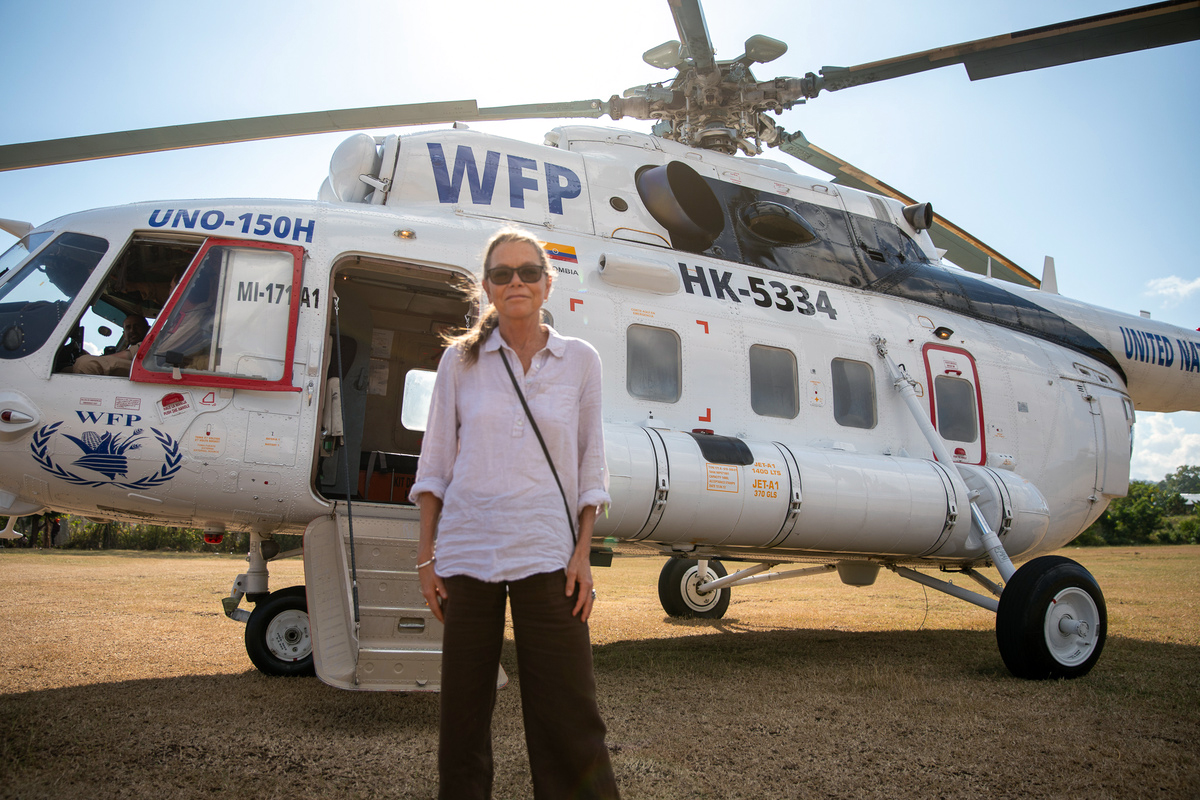
Ulrika Richardson 07:59
It is. I would say on the one hand it’s extremely motivating. It's enormously interesting and motivating, in the sense that… Because it's the complexity of it is really intriguing in that sense. But at the same time, I feel bad about saying that it's interesting and motivating, because there is so much suffering that just those words don't fit with the reality of what Haitians are feeling. But it is difficult. But it's not impossible. And I think that is what keeps me going, a lot of us going, is that we see that it's possible.
Melissa Fleming 08:40
And what have you achieved that has made you feel maybe on a given day it is possible to change things and help people?
Ulrika Richardson 08:50
Well, I think we often feel that we don't do enough. So, that is normally a feeling at the end of the day is like, ‘Yeah, well, we did this but, you know, we could have done more, for example.’ But I think when we know that we've… You know, I get reports from and pick up the phone, speak to my colleagues, the agencies. If they've been able to help in certain neighbourhoods, either with mobile clinics to support some of the victims of the sexual violence. You know, get help to women who have then been subject to rape, that feels very meaningful. When I visit cholera treatment centres and I see that yes, children are being helped. Babies who are extremely skinny. You can't get, you know, the rehydration liquid in because they're so dehydrated already. So, it's difficult. But when we see that you can help people. And when you speak to some of those staff in those health centres and they say ‘Yeah. No, we haven't had one mortality. Not one death in the last week, for example.’ Then, you share that joy, and you can really feel … That sort of makes your day when you hear it.
Melissa Fleming 10:03
But you have to get there, right? I mean, I understand that some people suffering from cholera actually die at home because they are worried that if they leave, they actually might die an even worse death of getting shot.
Ulrika Richardson 10:19
Yeah, so what we realize is that some people can't get to help, right? Transport but also insecurity. Sometimes even knowledge. I was really happy to see that in some of these cholera treatment centres, that there were quite a lot of mothers and children. And they seemed to know where to go. So, that was… There was a long line of mothers and children sitting and waiting. Many of the children already with diarrhea and dehydrated. But you could sense that there was… They knew where to go. And they knew that, you know, if I get help now, my baby doesn't need to die.
Melissa Fleming 11:07
What is keeping you awake these days when you're thinking about the situation in Haiti?
Haiti received over 1.17 million doses of oral #cholera vaccine this month. Another 500,000 doses are expected to arrive in the coming weeks. Take part in the national vaccination campaign to help curb the disease's transmission. https://t.co/PMz8Fpllht pic.twitter.com/wKjq2Rk5gM
— Nations Unies Haïti (@UNHaiti) December 26, 2022
Haiti could see famine conditions, unless a robust humanitarian aid plan is put in place, @WFP warns.
— UN Geneva (@UNGeneva) December 12, 2022
"This crisis will not pass – it needs renewed and robust humanitarian assistance." -- @CreoleBauer @WFP_Haiti https://t.co/7Bu9fO166J pic.twitter.com/Yy4KGj4drb
Ulrika Richardson 11:11
I mean, I think when you see people suffer, those images stay with you. You don't, you know… But when I speak to colleagues and people that you can sort of confide in and, you know, and you can cry a little bit, because you need to evacuate some of those feelings, right? But I think when you go to sleep, you have those images. And I think that keeps you awake, and it should keep you awake.
Melissa Fleming 11:37
Is it especially children?
Ulrika Richardson 11:38
Yeah, for me it's … And also, when I go and see and meet with young women who've been raped. And so, there was a group of… I had a conversation with maybe five, six of them. And some of them were, I thought looked so young that I was really wondering if that was their own child that they had or if it was a sibling. But I knew that it was all their children. But it was… And then, you know, it was difficult to talk to them because I didn't want them to tell me their story. That's not why I was there, to sort of agonize them. It was more to hear, you know, what they were thinking. You know, what next? And they were, you know… You could see that they were moving forward. But that's also difficult when you see, you know, girls 14 and 15 and already mothers and out of rape. And that's, you know, but really courageous like… So, that hope also, it sort of makes you be able to sleep at the end of the day. But I think those images…
Melissa Fleming 12:49
And you were in a UN safe shelter.
Les survivantes de #violence en Haïti méritent la #justice et rien de moins. Même après les #16JoursdActivisme, restons solidaires pour éliminer les violences à l’égard des femmes et des filles sous toutes leurs formes. #KwapeVyolansKontFanmAkTifi #PaFèSilans @GlobalSpotlight pic.twitter.com/pbT79NAhKl
— Nations Unies Haïti (@UNHaiti) December 10, 2022
Ulrika Richardson 12:52
Yeah, this was particular because these were minors. So, this was a UNICEF, actually a UNICEF-supported organization that specializes in girls, being mothers, and particularly those that have been raped. So, this was a Spotlight-supported project. And really, again, enormously impressive when you talk to the staff. And you just think that the world is composed of so many good people.
Melissa Fleming 13:26
Do you have children yourself?
Ulrika Richardson 13:27
Yes, I have a son. He's 27.
Melissa Fleming 13:31
What does he think about your being in Haiti?
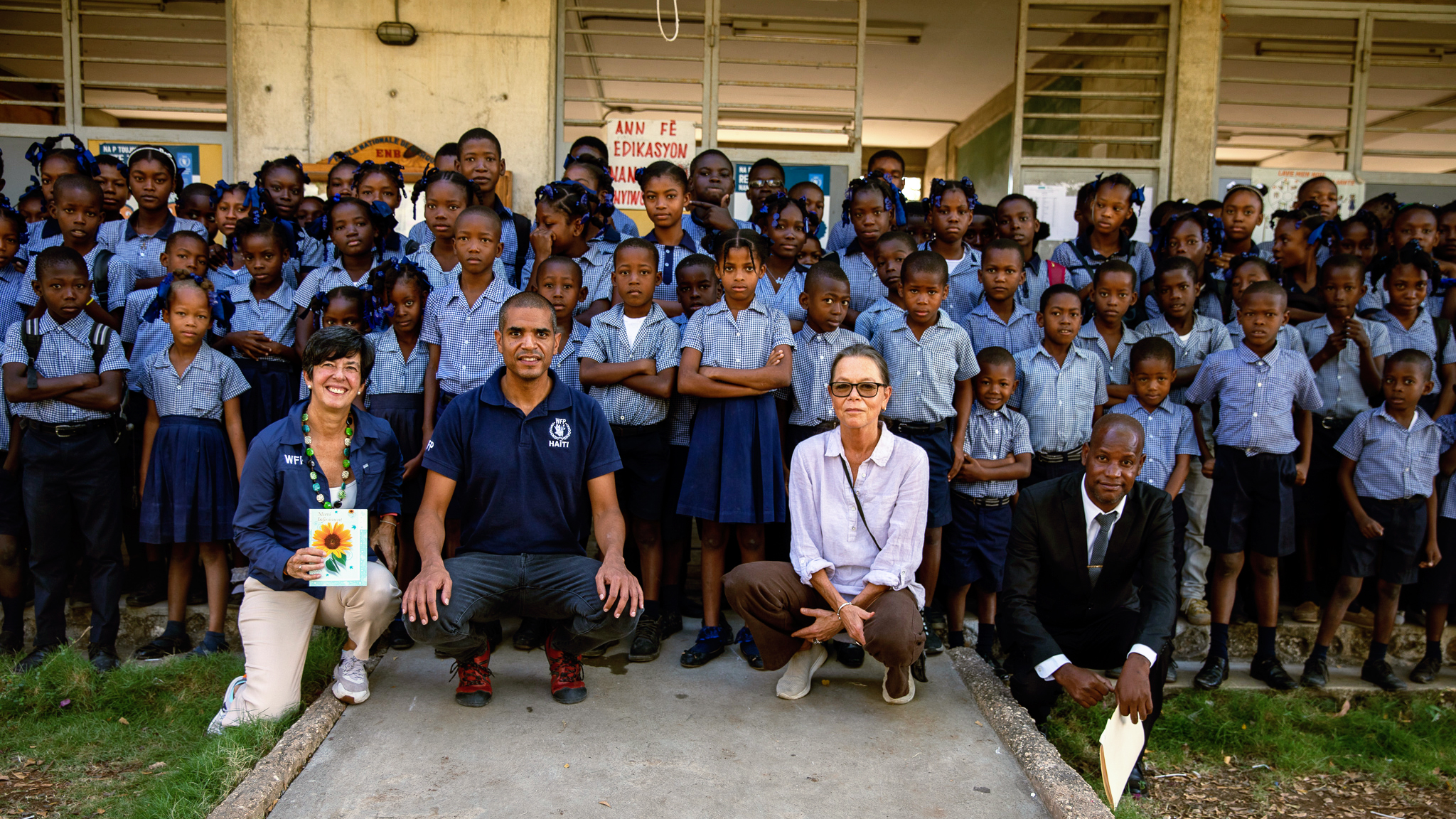
Ulrika Richardson 13:33
Well, we speak every day. He's worried about me. But he knows also that he can't do anything to stop me. And so, he says, ‘Do you really need to go out today? Can't you do this meeting in the office? And are you sure…? You know, have you checked with security and so on?’ But he I think he's also sometimes when he hears me or sees me somewhere, he's quite proud of me, I think as well. So, yeah.
Melissa Fleming 14:03
He’s kind of used to this.
Ulrika Richardson 14:05
He is kind of used to it, but he also knows that I'm a bit of a risk taker. So, he tries to sort of put me sometimes, you know, ‘Do you really need to do this? Have you thought? Have you spoken to…?’ You know, so he's a little bit of a…
Melissa Fleming 14:20
Kind of a reverse role. Taking care of you.
Ulrika Richardson 14:23
He's been with me. He left…He was one year when we left Sweden. He’s lived in Sweden now, but he never did before.
Melissa Fleming 14:32
So, where did you take him to?
Ulrika Richardson 14:37
Well, I took him to… First, we took him to Geneva that was a bit of a soft landing. And then it was Côte d’Ivoire. It was Cuba. It was Turkey. It was Gabon. Yeah, in between Côte d’Ivoire. So, I mean, it was many places and then in the end I think he said, ‘Well, I'm going off to university at some point.’ And that he did. But he's very independent, obviously. And I think sometimes I had to… I obviously selected also. Sometimes he said, ‘No, I'm not, I'm not going with you again. I rather go into boarding school.’ And so sometimes I stayed longer in places just for him. But yeah, he's sometimes the reverse role.
Melissa Fleming 15:21
Has he then decided to follow in your footsteps a little bit or has he just wanted to stay put in Sweden?
Ulrika Richardson 15:27
Now he's actually into peace and conflict. And yeah.
Melissa Fleming 15:35
I think early in your career you worked for the Swedish immigration board in a refugee camp. Can you tell me about that?
Ulrika Richardson 15:46
Yeah. So, this was in Sweden, but it was during the Balkan War. And I was… So, I had actually recently come… I'd been in Guinea Bissau. I was very young. How I ended up there is a long story, but I was 20. And I think that when I went there, which was also a bit coincidental, because not many people in their 20s go to Guinea Bissau when you're in Sweden. I think that sort of created… It was not for the UN. Or if I was 19, even. And so, but it created this feeling that Sweden is really a very small place. And we're really, really lucky, you know. And it gave me also this curiosity, the excitement of seeing new things and cultures and smells and tastes and all of that. And so, but then I came back to Sweden, and I started this job at the… This was exactly it was must have been ’92. Yeah, so it was just after the real height of the Balkan War. And so, you had the refugees from Bosnia Herzegovina, in particular. And it was really, for me, it was so heartbreaking. And not heartbreaking but it was just again the injustice and the suffering that you can see that people had had and the war memories. But also, the strength of those people. It was amazing. And I met again with a lot of women. We organized. I'm not a lawyer. So, my role was to make sure that people's wellbeing… I was responsible for the wellbeing of the refugees in the camp.
Melissa Fleming 17:39
That's a big responsibility for people having fled a horrific war.
Ulrika Richardson 17:42
Yeah. So, I remember, we set up coffee rooms, and they played, not chess, but sort of other table games for the men. They wanted to be together. And we had to arrange that they could smoke inside and in Sweden, and already back then that was a big, big issue. But we managed. And then women wanted… I checked. I tried to see what people wanted. We had groups and I could listen to… They had spokespeople. So, then women wanted to, they wanted to have a big kitchen. Yeah. And then they wanted to be able to go out and shop food themselves. Okay, so we arranged that. And then they wanted to have a sewing machine so that they could, you know, whatever, clothes and stuff. And then the children wanted… You know, we had something for the teenagers. And so, it was really… But it was also I think, for me it was really… Since then, I always wanted to work with refugees, but I just never did. I never worked for UNHCR, for example.
Cholera’s continued spread in Haiti a ‘worrying trend’
8 December 2022
As cholera continues to spread in Haiti, a $145 million appeal to support the response is only 16 per cent funded, Ulrika Richardson, top UN aid official there reported. A flash appeal was launched last month to support emergency cholera response and to provide life-saving assistance to 1.4 million people living in affected areas. Some $23.5 million has been received to date, said Richardson.
Photo credit: ©UNOCHA/Christian Cricboom
Melissa Fleming 18:48
How did you come to join the UN then?
Ulrika Richardson 18:50
Well, I…You know, it was the combination. I had Guinea Bissau. I had this refugee experience in Sweden, but it was like being almost in the Balkans. You know, it was amazing actually. And so then… And in Sweden it was, the UN had represented such a noble institution. And I think it's probably changed a bit. I mean, I think in Sweden, maybe now people don't know the UN the same way. But at the time, you know, for me it was always something that I had admired. And there was the legacy of Dag Hammarskjöld, and I had his book. And someone had given me the Charter. I still have it. It hardly.... I think the pages are all you know, almost…
Melissa Fleming 19:52
The small UN Charter books.
Ulrika Richardson 19:54
And it is very old by now. So, I think it was always something, a dream. And so, then when I… There was this JPO.
Melissa Fleming 20:07
Junior Professional Officer.
Ulrika Richardson 20:09
Exactly.
Melissa Fleming 20:10
And you were how old at the time?
Ulrika Richardson 20:11
Well, then I was already… Because I had worked for refugee, I’d just had my son. So, I must have been 28-29. Something like that, right. So, then we went to Geneva to work for UNV.
Melissa Fleming 20:26
UN Volunteers.
Ulrika Richardson 20:27
Yeah, UN Volunteers. And it was a beautiful experience. Because I had such good colleagues. It was best times of my year, almost. My son basically lived in the office. And then it moved on from there. But it was really for me the UN. Since school we read about the UN. And it was, this was the… You know, it was like, you know, the embodiment [of], of course, humanity. In my view, dignity, human dignity, and also of hope. So, for me, that was like, no doubt what you wanted to work for. Absolutely no doubt.
Melissa Fleming 21:14
And you managed to get there. So, obviously Geneva is not a tough field situation. But I think that was the last time you were in any kind of comfortable posting. So, you were based in Kosovo as the UN Development Coordinator.
Ulrika Richardson 21:31
Yes.
Melissa Fleming 21:32
What kind of challenges did you face there?
Ulrika Richardson 21:38
Oh, I always think back of countries where I've worked in with a smile, and I have this warmth. And I always tell colleagues when I leave… Because I always make sure that there is a farewell party, you know. You have to do a farewell. You know, I think it's very important that you mark coming and going. And particularly in our life. And I think also in lives of officers because they see so many people come and go. But I always say, and I think I can't remember when I first felt it, but you really… You know, you feel that you leave like the French say, ‘To say goodbye is like dying a little.’ And so, which is true. But instead of sort of your heart shrinking after every piece that you've left behind, you just feel it sort of expanding. I sound a bit corny, but you do feel that it's expanding. So that's why I smiled because we had the most beautiful team there.
Melissa Fleming 22:40
And the going away party must have been memorable.
Ulrika Richardson 22:41
It was very memorable.
Melissa Fleming 22:45
And it was a very intense time.
Ulrika Richardson 22:47
Yeah, it was a very intense time. It was very different. And not so much humanitarian, obviously. A very different context. A very historically complex and a very geographically complex context. Hugely interesting. Hugely amazing region. Amazing people. And obviously, Kosovo is it's not a Member State of the UN. So, that was a completely new way of working with a government who was not a Member State.
Melissa Fleming 23:27
And how about Côte d’Ivoire? What were you doing there?
Ulrika Richardson 23:31
Well, Côte d’Ivoire was different. In fact, there I was working for… I had a small break from the UN. I took a sort of… and tried to work for the African Development Bank. So, I wanted to know how it was to work for a multilateral bank to understand that side of our work. Because in the UN we have a relationship with the financial institutions. And I had done my thesis… Actually, I went back to Guinea Bissau at some point when I was a student and did a thesis on the structural adjustment programme at the time. And what lot of problems it had actually created in Guinea Bissau. But so, I was very curious to see how it was to work in a multilateral financial institution. I was there for two years. And then I thought, ‘I think I go back to the UN.’ But I must say I had learned a lot and Côte d’Ivoire, again was… This was just the time before the war. So, it was a lot of instability and a lot of concern in terms of coup d’états happening very frequently. And I was in one side of the city and my son was in school somewhere else. And the military was just in between us. And that was… There were situations where I was a bit nervous.
Melissa Fleming 25:04
About him.
Ulrika Richardson 25:05
Yeah.
Melissa Fleming 25:06
And you raised him as a single mom?
Ulrika Richardson 25:09
No. So, I was… My husband was not there. He was working in Germany at the time. So, we were married. So, I've not always… I haven't been single. But we've been working in different places. So not always together. And then at some point, we divorced as well.
Melissa Fleming 25:33
As I know, young people who are thinking about joining the UN and embarking on a career and maybe going to the field, they do worry about this. You know, whether they could have a family, have a relationship, have a marriage? Can one?
Ulrika Richardson 25:50
Yes. One can. When I talked to some… Often in Sweden, they asked me to talk to outgoing Junior Professional Officers, or UNVs, UN volunteers that Sweden financed. And that's a question that comes up. And I say, ‘It is absolutely possible. It is a give and take. But it is absolutely a journey that you can do with a partner, with a family, with a child. Or many children for that matter.’ And it's just that it requires you to think a little differently. And to make choices that are, you know, sometimes… You know, they will just have to be not only suitable to you but to the entire family structure. And I always say that it's actually very important to keep the family together. Because I think it's a very… It's the best way of having a UN journey. If you decide to have a family, is to keep it together. So, it is absolutely possible. And I get a lot of those questions.
Melissa Fleming 26:54
Did your son ever complain about having to pick up and move over and over?
Ulrika Richardson 26:58
Yes, I think there was one… I remember we were in Turkey. And so, we came from Cuba to Turkey. And for him, it was a huge, huge transition. Not easy. And the international school in Turkey, they all spoke Turkish. And he didn't know a word of Turkish. He was like more English, Spanish, Swedish. And he was small and had whatever, Rasta, I think curls in his hair because he refused to brush his hair. And then he came to this Turkish school. And anyway, he didn't… It wasn't easy for him. So, after half year, he said, ‘I'm leaving. I can't.’ You know, and he was 13 or 14. He said, ‘I'm [inaudible] to check boarding schools in Sweden.’ And I said, ‘No, please. I promise you another half year. If you don't like it, I promise you we will move.’ And so half year went, and we sat down again. And then he said, ‘No, no. I'll stay.’ And he got his best friends of his life. He has his friend. They're still friends. He's fluent in Turkish. I think his dream was probably to be able to live and work in Istanbul. But then, after two years, I was offered a really nice job here at headquarters. Really a good one. And I really wanted so I told him, ‘Listen! You know, I've been offered this job in New York. You know, that would be fun, wouldn't it?’ And he's like, ‘You go Mom. I'll stay here.’ I didn't go. I thought I have one son, you know, at least.
Melissa Fleming 28:35
And a few more years in high school. Those critical years. Wow, he speaks Turkish. He speaks Spanish. He speaks French. So, he probably has no regrets as well. He has this amazing, rich childhood.
Ulrika Richardson 28:52
Yeah.
Melissa Fleming 28:55
Is there any place when you sit back and look on places you were based or moments that you had that kind of fill you with joy?
L’art est l’instrument de paix et de vivre ensemble. L’artiste, l’artisan à travers tout Haïti nous en donne la preuve depuis plusieurs décennies. Nous sommes confrontés à un sérieux défis de survie. Tout notre soutien @UlrikaR_UN#MadeInHaiti pic.twitter.com/pKqua05s6k
— Nations Unies Haïti (@UNHaiti) December 20, 2022
Ulrika Richardson 29:10
All of them. Really, I mean, I must say, as I said, it's like I have these huge memories of every place. And it is really a combination. But I think what really… I mean, it's the culture of the place. And as I said, you know, every place has its smell, and it has taste, food and art and people. But for me, it's really… What I think mostly attaches you to place is actually the teams and the officers. So, for me, I always tried to get to know people that I work with. Because you spend 10 hours a day at least with them, if not more. In Haiti… Well, I mean, can you imagine if we wouldn't get on at work?
Melissa Fleming 30:02
It's not like you can decide to go out to a restaurant or to a museum now in this current dangerous stage.
Ulrika Richardson 30:09
No. And if you decide to work from home, you would be completely isolated, and it wouldn't work. So of course. Yeah. So, I think it's really the people around you that makes such a difference. And I know that we get a lot of as the UN… There's a lot of perception about who we are and what we do. And you know, are we, you know… We're very bureaucratic, or we are this, or we are the other. But there's so many good people in the UN. So many good people.
Melissa Fleming 30:38
And they're all trying to make the world a bit better.
Ulrika Richardson 30:41
Yes. And it sounds, you know, sounds idealistic. And I say, but we are idealistic. It is an idealistic organization. So, for me, I think there was nothing wrong to be idealistic. You have to be… You have to have your feet on the ground, you know. But I think if you don't have ideals, I think it would be very difficult. But so, I think that there are many of us. Many. And it's so nice when you meet people, young people or older people. And I always say, when I speak to younger staff that, you know, if they feel that they have a heart in the UN, stay. Because I say the UN will need every good, young energy, and individual. Because there is a huge task to do.
Important announcement: Overcoming insecurity, access constraints & fuel shortages @WFP stayed & delivered this year in #Haiti
— WFP Haiti (PAM) (@WFP_Haiti) December 21, 2022
reaching
1.7 MILLION people
exceeding our 2022 target
A success worth celebrating this festive season ! pic.twitter.com/tAODrxFLt3
Melissa Fleming 31:35
There's a huge task to do. When you think about how every human should live, how do you see…? What is it that every human being deserves?
Ulrika Richardson 31:51
I think, respect, dignity, humanity. For me, a lot of it is dignity. And I think that's also… It's sometimes a conundrum in our work. Because, you know, to give… You know, humanitarian assistance is a lot of giving and providing for. You need to do that in a way that it preserves the recipient, that it preserves that recipient’s dignity.
Melissa Fleming 32:22
Because very often they're not used to handouts.
Ulrika Richardson 32:24
No.
Melissa Fleming 32:25
Before they were working, before the violence came. Yeah.
Ulrika Richardson 32:29
And that, for me, that is something that I think we have… That for me is key to really making a difference where we do no harm.
Melissa Fleming 32:41
Is there a sense that you're living life more intensely when you're witnessing and helping in such extreme circumstances?
Ulrika Richardson 32:51
Yeah, I think so. I think it is. There is such a rhythm of things that is really… Often it’s like, we've now started to have meetings on Saturday. So then, then I'm thinking, ‘Maybe it's not so good to expand the week to six working days.’ But it's really so intense that, you know, those additional meetings - those people that you really need to sit down just for a chat to understand better and to, you know - they are now on Saturdays.
Melissa Fleming 33:25
Well, I guess the needs don't stop for the weekend.
Ulrika Richardson 33:30
Yeah. But the intensity of it is… You need a lot of stamina, I think. Yeah.
Melissa Fleming 33:38
What do you do in your downtime?
Ulrika Richardson 33:44
I walk, which is a challenge in Haiti, because we can't walk outside. And basically, we can't walk on the streets. And we also have, like a limitation of… We shouldn't move outside after 6:00 or 7:00. And in any way, you can't walk outside. So, we can't go to the mountains and walk for example. So then where I live, I can walk around in circles. And I do it for an hour. But there are trees and flowers and lovely orchids and birds and stuff. So, I do that. And it’s a lot of rounds of circles. You just have to forget that you look silly. And so, it's a bit of a meditation. So, I do that. I try to do it at least…. Even if it's late at night, I do 10 minutes but normally I try to get an hour of walking in the evenings and then maybe a little yoga before I go to bed, you know. And then I normally read a book or watch something that is not work.
Melissa Fleming 34:51
That is not Haiti.
Ulrika Richardson 34:52
Yes. Half an hour and then…
Melissa Fleming 34:56
So, you have dedicated your life to helping people in desperate circumstances. How can others contribute?
Ulrika Richardson 35:05
Well, I think… Again, I think everyone is, you know… You take charge of your own life, and you lead your own life. And I think there are a lot of heroes. I have a lot of heroes in my life. And so, I think everyone can do something useful on your own street or in your workplace. We can all be humans and sort of help others. Being there for others. And I think we more and more need that actually. Because I think this very sharp individualism, I think is a bit dangerous. Because at the end of the day, we are very collective, you know, human beings. We're very collective beings. We were not born to be alone. I mean, we all need time alone, because that's when we sort of also recharge a bit. But I think everyone can be helpful to others. Being there, listen, and you know, just trying to understand and be curious about the world around you, and people around you.
Melissa Fleming 36:22
Thank you, Ulrika
Ulrika Richardson 36:24
Thank you, Melissa.
Melissa Fleming 36:30
Thank you for listening to Awake at Night. We'll be back soon with more incredible and inspiring stories from people working to do some good in this world at a time of global crisis.
To find out more about the series and the extraordinary people featured, do visit un.org/awake-at-night. On Twitter, we’re @UN and I'm @melissafleming. Subscribe wherever you get your podcasts and please do take the time to review us. It helps more people find the show.
Thanks to my editor Bethany Bell, to Jen Thomas, Adam Paylor and the team at Purpose and to my colleagues at the UN: Roberta Politi, Katerina Kitidi, Geneva Damayanti, Tulin Battikhi, Bissera Kostova and the team at the UN studio. The original music for this podcast was written and performed by Nadine Shah and produced by Ben Hillier.
